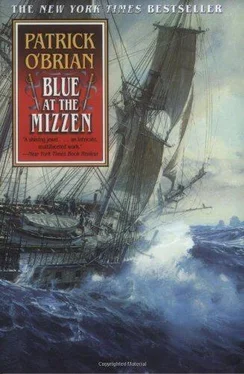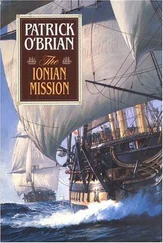Patrick O'Brian - Blue at the Mizzen
Здесь есть возможность читать онлайн «Patrick O'Brian - Blue at the Mizzen» весь текст электронной книги совершенно бесплатно (целиком полную версию без сокращений). В некоторых случаях можно слушать аудио, скачать через торрент в формате fb2 и присутствует краткое содержание. Жанр: Книги. Описание произведения, (предисловие) а так же отзывы посетителей доступны на портале библиотеки ЛибКат.
- Название:Blue at the Mizzen
- Автор:
- Жанр:
- Год:неизвестен
- ISBN:нет данных
- Рейтинг книги:4 / 5. Голосов: 1
-
Избранное:Добавить в избранное
- Отзывы:
-
Ваша оценка:
- 80
- 1
- 2
- 3
- 4
- 5
Blue at the Mizzen: краткое содержание, описание и аннотация
Предлагаем к чтению аннотацию, описание, краткое содержание или предисловие (зависит от того, что написал сам автор книги «Blue at the Mizzen»). Если вы не нашли необходимую информацию о книге — напишите в комментариях, мы постараемся отыскать её.
Blue at the Mizzen — читать онлайн бесплатно полную книгу (весь текст) целиком
Ниже представлен текст книги, разбитый по страницам. Система сохранения места последней прочитанной страницы, позволяет с удобством читать онлайн бесплатно книгу «Blue at the Mizzen», без необходимости каждый раз заново искать на чём Вы остановились. Поставьте закладку, и сможете в любой момент перейти на страницу, на которой закончили чтение.
Интервал:
Закладка:
With all its disadvantages of close quarters, lack of privacy, and desperate shortage of post, to say nothing of books, newspapers, magazines, it was indeed a return to order, to that unquestioned order so absent in life, above all urban life ashore. In a very little while they might have been back in a sea-going monastic order - monastic, but for the shocking prevalence of pox in its dismal varieties that kept Stephen, and at a certain remove his loblolly girl, so busy.
How quickly the old train of life, ruled by bells and pipes, the swabbing of decks, by quarters, lights out, the cry of sentinels and all the rest came back - all the rest including an excellent appetite, particularly among the young, who, when invited to the captain's breakfast-table (which often happened if they had had the morning watch) would eat four eggs without a blush and then finish whatever happened to be in the bacon-dish. Good appetites, together with a longing for a change of diet and, among the older seamen, a dread of running out of stores, so that now, when they had scarcely sunk the high land behind Rabat, they cheered the foretopmast look-out when he hailed the quarterdeck with the news of a body of tunny-fishers standing along the Moroccan coast; and when the Captain altered course to meet the boats even the grizzled old fo'c'sle hands capered like lambs on a summer's green.
Here the Surprise bought a fine great fish, still quivering, hoisted him aboard, cut him up on the fo'c'sle, carried the massive pieces to the galley in tubs, washed the red blood off the deck, swabbed and flogged it dry, and ate an improbable amount for dinner. A very great deal: yet even so, the wind veering northerly, they were still eating him for supper the next day, officers, men, boys, and the few women they were allowed, such as Poll Skeeping and Maggie Tyler the bosun's wife's sister, eating him steadily with active pleasure and what little Gibraltar beer they still had aboard, when the cry came down from the starving masthead: 'On deck, there, on deck. Land very fine on the starboard bow. Sort of reddish, like,' he added in an undertone.
'I believe that must be our landfall almost to the minute,' said Jack, looking at his watch with great satisfaction. A brief-lived satisfaction, however, for when they cut their meal short, carrying coffee up on to the quarterdeck, they found the whole gunroom and most of the midshipmen's berth already there. On seeing their Captain, the officers cast a guilty look aft and sidled forward along the starboard gangway. Only Harding, as in duty bound, remained. 'It may not be as bad as it looks, sir,' he said.
It did indeed look bad: very bad. The 'sort of reddish' was now a great crimson blaze all along that part of the town where ships were built, including Coelho's famous yard: a great blaze with huge flames soaring and even cracking off to soar alone.
The ebbing tide and falling wind kept the frigate well off shore until first light, when it was already apparent that the fire was growing sullen. At slack water the breeze revived a little and they stood on, pumps and fire-hoses ready. But it was clear that the townsmen had the upper hand, and there was nothing that strangers could do but keep out of the way until ordinary life resumed; if, indeed, it ever did. There was scarcely a man aboard Surprise who had not seen a dockyard, a ship-building yard, ablaze, together with all its stores of timber, its rigging-lofts and all the vessels on the stocks: but this outdid anything the Adriatic or the Aegean had had to offer on their last campaign.
After a silent breakfast, with all hands gazing at the blackened ruins and the vessels burnt to the water-line, with smoke still rising over all, they approached the good holding-ground where they usually checked their way with a kedge in order to salute the castle handsomely, broadside on.
The castle already had its colours flying, still, as Jack noticed with the British next to the Portuguese; but the gunners within, presumably exhausted from their night's labours, could not gather their wits to return the civility for close on five minutes; and during this time a small, dirty, unofficial boat put off and pulled for the frigate. A very thin young man, in what could still just be described as naval uniform, came up the side, and taking off his hat to Captain Aubrey, said in a fluting, intensely nervous voice, 'Wantage, sir: come aboard, if you please.'
'Mr. Wantage,' said Jack, looking attentively into his face, in part familiar, yet strangely altered. 'There is an R against your name.' The young man, a master's mate, had not responded to the ship's repeated signals, and she had left Funchal without him. It was known among his shipmates that he was much attached to a shepherdess in the hills, and his absence was attributed to this liaison.
'Yes, sir. But it was not my fault. A gang of men took me far into the mountains and kept me shut up. They beat me every Sunday, taking turns, until a monk said it was hardly right. And they were very cruel to me, sir: they cut me.'
Certainly he was very much reduced: and very deeply embarrassed. Most of those aboard had some knowledge of the countryside, some acquaintance with the practices of shepherds; and they were aware of his present condition.
'Pass the word for Mr. Daniel,' said Jack: and two moments later, 'Mr. Daniel, here is a colleague for you, Algernon Wantage, master's mate, who was detained in the mountains when the ship was called to Gibraltar, but who has now rejoined. Take him below, show him the new members of the berth, remind them of his seniority, and make him as comfortable as our limited space allows.'
'Yes, sir,' said the one, and 'Thank you, sir,' said the other.
'And now I come to think of it, Mr. Wantage,' he called after them, 'I believe we carried off your sea-chest and other belongings. Jason, tell one of the holders to rouse them out. Mr. Harding, as soon as I have paid my duty-call on His Excellency, I believe we must talk to the port-captain. Doctor, you will be so very kind as to interpret for us, as you did before?'
Stephen bowed: but when they had put on formal clothes he said, 'Interpret, is it? As I told you before I do not speak - not as who should say speak - Portuguese. Still less do I understand the language when it is spoke. No man born of woman has ever understood spoken Portuguese, without he is a native or brought up to comprehend that strange blurred muffled indistinct utterance from a very early, almost toothless, age. Anyone with a handful of Latin - even Spanish or Catalan - can read it without much difficulty but to comprehend even the drift of the colloquial, the rapidly muttered version. . .'
The captain of the port, however, was a master of the lingua franca spoken over most of the Mediterranean and even beyond, as well as the archaic Catalan still current in his mother's part of Sardinia, and it took him very little time indeed to destroy Jack Aubrey's hopes entirely, speaking with the utmost loquacity, sometimes in one language, sometimes in the other - the different versions each shedding a dismal light on the other. He addressed himself entirely to Stephen, but at the same time he gazed upon Jack with unfeigned astonishment and concern. 'Had not the gentleman seen with his own eyes that Coelho's yard, the glory of Funchal, of Madeira, of the western world, was utterly destroyed? That there was not another in the whole island to be mentioned in the same breath? And that even Carteiro's could not possibly accommodate anything above a hundred and twenty tons?' The captain of the port shook his saddened head. He called for madeira of the famous year 1775, and when they had drunk a couple of glasses each, he observed in a gentle side-voice directed at Dr. Maturin, though his eyes still dwelt upon Jack, that 'he wondered where the gentleman had been in his youth, and during all the years since then, not to know that at this time of the year there was not a seaman in Madeira, with two hands and both legs, to be had. The fleets bound for both the Indies, East and West, had sailed a little early, because of Nostradamus; and all who did not go with them were on the Banks for cod or in the tunny-boats along the African shore. And even the few odd remaining cripples could not possibly be tempted by a hydrographical voyage to survey the Horn and its terrible passages, with no possibility of taking a prize.'
Читать дальшеИнтервал:
Закладка:
Похожие книги на «Blue at the Mizzen»
Представляем Вашему вниманию похожие книги на «Blue at the Mizzen» списком для выбора. Мы отобрали схожую по названию и смыслу литературу в надежде предоставить читателям больше вариантов отыскать новые, интересные, ещё непрочитанные произведения.
Обсуждение, отзывы о книге «Blue at the Mizzen» и просто собственные мнения читателей. Оставьте ваши комментарии, напишите, что Вы думаете о произведении, его смысле или главных героях. Укажите что конкретно понравилось, а что нет, и почему Вы так считаете.












